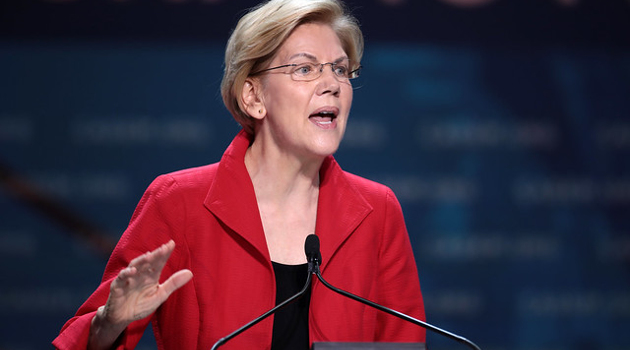Arthur Okun was a well-known left-of-center economist last century. He taught at Yale, was Chairman of the Council of Economic Advisors for President Lyndon Johnson, and also did a stint at Brookings.
 In today’s column, I’m not going to blame him for any of LBJ’s mistakes (being a big spender, creating Medicare and Medicaid).
In today’s column, I’m not going to blame him for any of LBJ’s mistakes (being a big spender, creating Medicare and Medicaid).
Instead, I’m going to praise Okun for his honesty. Is his book, Equality and Efficiency: The Big Trade Off, he openly acknowledged that higher taxes and bigger government – policies he often favored – hindered economic performance.
Sadly, some folks on the left today are not similarly honest.
A column in the New York Times by Jim Tankersley looks at the odd claim, put forth by Elizabeth Warren and others, that class-warfare taxes are good for growth.
Elizabeth Warren is leading a liberal rebellion against a long-held economic view that large tax increases slow economic growth… Generations of economists, across much of the ideological spectrum, have long held that higher taxes reduce investment,
slowing economic growth. …Ms. Warren and other leading Democrats say the opposite. …that her plans to tax the rich and spend the revenue to lift the poor and the middle class would accelerate economic growth, not impede it. …That argument tries to reframe a classic debate…by suggesting there is no trade-off between increasing the size of the pie and dividing the slices more equitably among all Americans.
Most people, when looking at why some nations grow faster and become more prosperous, naturally recognize that there’s a trade-off.
So what’s the basis of this counter-intuitive and anti-empirical assertion from Warren, et al?
It’s partly based on their assertion that more government spending is an “investment” that will lead to more growth. In other words, politicians ostensibly will allocate new tax revenues in a productive manner.
Ms. Warren wrote on Twitter that education, child care and student loan relief programs funded by her tax on wealthy Americans would “grow the economy.” In a separate post, she said student debt relief would “supercharge” growth. …Ms. Warren is making the case that the economy could benefit if money is redistributed from the rich and corporations to uses that she and other liberals say would be more productive. …a belief that well-targeted government spending can encourage more Americans to work, invest and build skills that would make them more productive.
To be fair, this isn’t a totally absurd argument.
The Rahn Curve, for instance, is predicated on the notion that some spending on core public goods is correlated with better economic performance.
It’s only when government gets too big that the Rahn Curve begins to show that spending has a negative impact  on growth.
on growth.
For what it’s worth, modern research says the growth-maximizing size of government is about 20 percent of economic output, though I think historical evidence indicates that number should be much lower.
But even if the correct figure is 20 percent of GDP, there’s no support for Senator Warren’s position since overall government spending currently consumes close to 40 percent of U.S. economic output.
Warren and others also make the discredited Keynesian argument about government spending somehow kick-starting growth, ostensibly because a tax-and-spend agenda will give money to poor people who are more likely to consume (in the Keynesian model, saving and investing can be a bad thing).
Democrats cite evidence that transferring money to poor and middle-class individuals would increase consumer spending…liberal economists say taxes on high-earners could spur growth even if the government did nothing with the revenue because the concentration of income and wealth is dampening consumer spending.
This argument is dependent on the notion that consumer spending drives the economy.
But that’s not the case. As I explained two years ago, consumer spending is a reflection of a strong economy, not the driver of a strong economy.
Which helps to explain why the data show that Keynesian stimulus schemes routinely fail.
Moreover, the Keynesian model only says it is good to artificially stimulate consumer spending when trying to deal with a weak economy. There’s nothing in the theory (at least as Keynes described it) that suggests it’s good to endlessly expand the public sector.
The bottom line is that there’s no meaningful theoretical or empirical support for a tax-and-spend agenda.
Which is why I think this visual very succinctly captures what Warren, Sanders, and the rest (including international bureaucracies) are proposing.
P.S. By the way, I think Tankersley’s article was quite fair. It cited arguments from both sides and had a neutral tone.
But there’s one part that rubbed me the wrong way. He implies in this section that America’s relatively modest aggregate tax burden somehow helps the left’s argument.
Fueling their argument is the fact that the United States now has one of the lowest corporate tax burdens among developed nations — a direct result of President Trump’s 2017 tax cuts. Tax revenues at all levels of government in the United States fell to 24.3 percent of the economy last year, the Organization for Economic Cooperation and Development reported on Thursday, down from 26.8 percent in 2017. America is now has the fourth lowest tax burden in all of the O.E.C.D.
Huh? How does the fact that we have lower taxes that other nations serve as “fuel” for the left?
Since living standards in the United States are considerably higher than they are in higher-taxed Europe, it’s actually “fuel” for those of us who argue against class-warfare taxation and bigger government.
Though maybe Tankersley is suggesting that America’s comparatively modest tax burden is fueling the greed of U.S. politicians who are envious of their European counterparts?
———
Image credit: Gage Skidmore | CC BY-SA 2.0.


